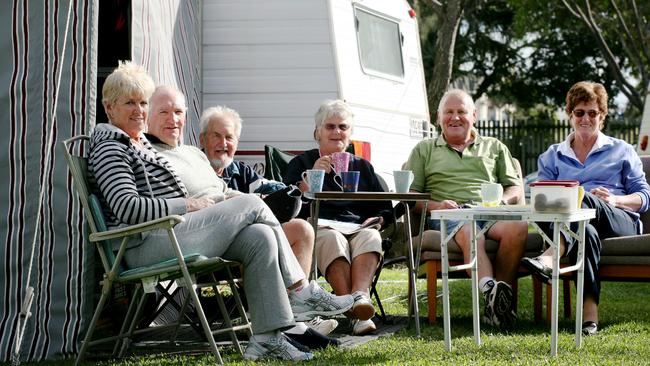Proposal to subsidise recreational vehicles and provide tourism vouchers to help sector
Travel vouchers and major taxpayer subsidies on new caravans would get wheels turning in more sectors than just tourism say industries pushing for more government buy-in to boost business.

Coronavirus
Don't miss out on the headlines from Coronavirus. Followed categories will be added to My News.
- How COVID is bringing back local shoppers
- Are you missing out on your latest subscriber-exclusive rewards?
Australians purchasing new motorhomes, caravans or camper trailers would get a ten per cent discount, paid for by the Federal Government, as part of a plan being pushed to stimulate the tourism and manufacturing sectors.
The Caravan Industry Association of Australia (CIAA) is urging the Federal Government to consider a stimulus rebate projected to underwrite $10 billion worth of economic activity.
Head of the association, Stuart Lamont, has also called for South Australia to follow the lead of the Northern Territory and Tasmanian governments and introduce a travel voucher system to be used across the state on tourism experiences.
The proposed ten per cent discount would apply to new recreational vehicles, including motorhomes, caravans or camper trailers, up to the value of $150,000.
Mr Lamont said for every 5000 additional RVs put on the road via the rebate, 3.2 million extra regional tourism nights could be generated.
“We need to do more than just throwing out bucketloads of money for people to just survive,” Mr Lamont told the Sunday Mail.
“We need to get people out there spending money, kickstarting the economy, and that is what we are trying to do.
“At a $58 return for every $1 invested by the government, this policy concept makes a
lot of sense.
“If people get a nice 10 per cent kick back in cash, they will go out and spend it while they are travelling.”
Mr Lamont said the same principles worked for a travel voucher scheme.
“The Northern Territory scheme went gangbusters ... and we expect the same in Tasmania,” he said.
“Australians are cooped up ... governments can do something to get people out into their backyards with encouragement to do so.
“You might give people a voucher for $200 but they are going to spend $1000.”
Australian Hotels Association SA general manager Ian Horne said the state had done a superb job of marketing regional areas and that it was paying dividends. However, he added, it would be worth watching the success of the voucher system in other states.
When asked about the CIAA proposal Federal Tourism Minster Simon Birmingham said the government had stepped up support for the tourism industry, including through cash payments to businesses of up to $100,000 and the extension of JobKeeper through to March next year.
“We’ll also continue to talk and engage with the tourism industry, and consider other targeted measures going forward to help further stimulate economic and tourism activity right across Australia,” Senator Birmingham said.
SA Labor Tourism spokeswoman Zoe Bettison has previously called for the State Government to offer a $200 SA tourism voucher to encourage South Australians to holiday in our own backyard and kickstart the local tourism industry.
MORE NEWS
Penberthy: Our paranoid states have shattered national unity
The rise and fall of Stephan Knoll
Romeo’s face $30m class action over underpaid wages claims
“The dollar-for-dollar scheme would provide a voucher of up to $200 if South Australians spent at least the same amount of their own money purchasing a bookable tourism product,” Ms Bettison said.
SA Best MP Frank Pangallo has also called for a voucher scheme.
Treasurer Rob Lucas outlined more than $120 million worth of measures the State Government are using to stimulate the tourism sector including “large-scale infrastructure projects at iconic destinations, such as the Flinders Ranges and on Kangaroo Island,” to $10,000 emergency cash grants for small business operators and millions in extra funding for domestic marketing campaigns to boost visitation.
“We are committed to ensuring the sector survives the greatest economic challenge of our time,” Mr Lucas said.
“We’ve also waived or reduced fees and charges for various operators, to assist in their day-to-day operations, and the Government will continue to explore other ways we might be able to further support the industry.”
